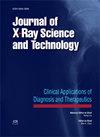利用改进的 CycleGAN 对受金属杂质污染的工业 CT 图像进行半监督分割
IF 1.4
3区 医学
Q3 INSTRUMENTS & INSTRUMENTATION
引用次数: 0
摘要
工业 CT 图像的精确分割在质量检测和缺陷分析等工业领域具有重要意义。然而,工业 CT 图像的重建通常会受到典型金属伪影的影响,这些伪影由光束硬化、散射、统计噪声和局部容积效应等因素造成。主要由于这些金属伪影的存在,传统的分割方法很难实现 CT 图像的精确分割。此外,获取完全监督网络所需的成对 CT 图像数据也极具挑战性。为了解决这些问题,本文介绍了一种改进的 CycleGAN 方法,用于实现工业 CT 图像的半监督分割。该方法不仅无需去除金属伪影和噪声,还能将金属伪影污染的图像直接转换为分割图像,而无需配对数据。在图像分割性能的定量评估中,Dice相似性系数(Dice)的平均值可达0.96645,Intersection over Union(IoU)的平均值可达0.93718。与传统的分割方法相比,它在定量指标和视觉质量方面都有显著提高,为进一步研究提供了宝贵的启示。本文章由计算机程序翻译,如有差异,请以英文原文为准。
Semi-supervised segmentation of metal-artifact contaminated industrial CT images using improved CycleGAN
Accurate segmentation of industrial CT images is of great significance in industrial fields such as quality inspection and defect analysis. However, reconstruction of industrial CT images often suffers from typical metal artifacts caused by factors like beam hardening, scattering, statistical noise, and partial volume effects. Traditional segmentation methods are difficult to achieve precise segmentation of CT images mainly due to the presence of these metal artifacts. Furthermore, acquiring paired CT image data required by fully supervised networks proves to be extremely challenging. To address these issues, this paper introduces an improved CycleGAN approach for achieving semi-supervised segmentation of industrial CT images. This method not only eliminates the need for removing metal artifacts and noise, but also enables the direct conversion of metal artifact-contaminated images into segmented images without the requirement of paired data. The average values of quantitative assessment of image segmentation performance can reach 0.96645 for Dice Similarity Coefficient(Dice) and 0.93718 for Intersection over Union(IoU). In comparison to traditional segmentation methods, it presents significant improvements in both quantitative metrics and visual quality, provides valuable insights for further research.
求助全文
通过发布文献求助,成功后即可免费获取论文全文。
去求助
来源期刊
CiteScore
4.90
自引率
23.30%
发文量
150
审稿时长
3 months
期刊介绍:
Research areas within the scope of the journal include:
Interaction of x-rays with matter: x-ray phenomena, biological effects of radiation, radiation safety and optical constants
X-ray sources: x-rays from synchrotrons, x-ray lasers, plasmas, and other sources, conventional or unconventional
Optical elements: grazing incidence optics, multilayer mirrors, zone plates, gratings, other diffraction optics
Optical instruments: interferometers, spectrometers, microscopes, telescopes, microprobes

 求助内容:
求助内容: 应助结果提醒方式:
应助结果提醒方式:


